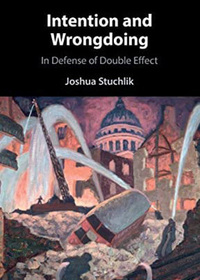
- University of St. Thomas
- Associate Professor of Philosophy
- Residential Fellow (2019-2020)
- “Intention and Wrongdoing”
Joshua Stuchlik is Associate Professor of Philosophy at the University of St. Thomas (MN). He is a philosopher who specializes in ethics, action theory, and epistemology. In epistemology, his research focuses on skepticism and perceptual knowledge. In ethics, his current research explores the moral significance of intentions and reasons for action. His book project is entitled Intention and Wrongdoing. In it he will argue that intentions are relevant to the moral permissibility of conduct by providing a comprehensive defense of the principle of double effect.
Professor Stuchlik is the author of eight articles, which have appeared in journals such as the Journal of the History of Philosophy, the Journal of Moral Philosophy, Synthese, and Philosophical Studies. He is assistant editor of the American Catholic Philosophical Quarterly.
Professor Stuchlik is the recipient of a Distinguished Early Career Grant from the University of St. Thomas and an Andrew W. Mellon Fellowship in Humanistic Studies.
Publications
-
Intention and Wrongdoing: In Defense of Double Effect
Cambridge University Press, 2021

According to the principle of double effect, there is a strict moral constraint against bringing about serious harm to the innocent intentionally, but it is permissible in a wider range of circumstances to act in a way that brings about harm as a foreseen but non-intended side effect. This idea plays an important role in just war theory and international law, and in the twentieth century Elizabeth Anscombe and Philippa Foot invoked it as a way of resisting consequentialism. However, many moral philosophers now regard the principle with hostility or suspicion. Challenging the philosophical orthodoxy, Joshua Stuchlik defends the principle of double effect, situating it within a moral framework of human solidarity and responding to philosophical objections to it. His study uncovers links between ethics, philosophy of action, and moral psychology, and will be of interest to anyone seeking to understand the moral relevance of intention.